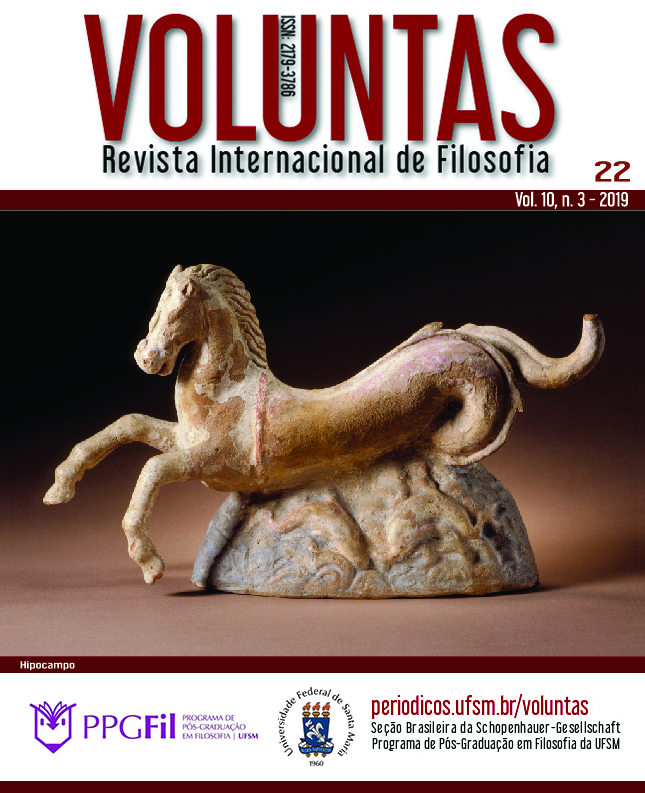Is the simulation theory of memory about simulation?
DOI:
https://doi.org/10.5902/2179378640399Parole chiave:
Episodic memory, Simulation, Simulation theory of memoryAbstract
This essay investigates the notion of simulation and the role it plays in Kourken Michaelian's simulation theory of memory. I argue that the notion is importantly ambiguous and that this ambiguity may threaten some of the central commitments of the theory. To illustrate that, I examine two different conceptions of simulation: a narrow one (simulation as replication) and a broad one (simulation as computational modeling), arguing that the preferred narrow conception is incompatible with the claim that remembering involves the simulation of past episodes. Investigating possible solutions, I suggest that, despite some relatively serious consequences, the theory may be better off subscribing to the broad notion of simulation.
Downloads
Riferimenti bibliografici
CARRUTHERS, P. Mindreading in Infancy. Mind & Language 28(2): 141-172, 2013.
Casati, R., & Varzi, A. Events. In: ZALTA, E. N. (Ed.), The Stanford Encyclopedia of Philosophy (Winter 2015). Retrieved from: https://plato.stanford.edu/archives/win2015/entries/events/
CHENG, S., & WERNING, M. What is Episodic Memory If It is a Natural Kind? Synthese, 193(5), 1345–1385, 2016. https://doi.org/10.1007/s11229-014-0628-6
CURRIE, G. & RAVENSCROFT, I. Recreative Minds: Imagination in Philosophy and Psychology. Oxford: Oxford University Press, 2002
DANKER, J. F., & ANDERSON, J. R. The ghosts of brain states past: Remembering activates the brain regions engaged during encoding. Psychological Bulletin, 136(1), 87–102, 2010. https://doi.org/10.1037/a0017937
DE BRIGARD, F. Is memory for remembering? Recollection as a form of episodic hypothetical thinking. Synthese, 191(2), 155–185, 2014. https://doi.org/10.1007/s11229-013-0247-7
De Brigard, F., & Gessell, B. S. Time is not of the essence: Understanding the neural correlates of mental time travel. In: MICHAELIAN, K., KLEIN, S., SZPUNAR, K. Seeing the future: Theoretical perspectives on future-oriented mental time travel. Oxford: Oxford University Press, 2016, p. 153–179. https://doi.org/10.1093/acprof:oso/9780190241537.003.0008
FISHER, J. C. Does Simulation Theory Really Involve Simulation? Philosophical Psychology: Vol 19, No 4, 2006.
GOLDMAN, A. I. Simulating Minds: The Philosophy, Psychology, and Neuroscience of Mindreading. Oxford: Oxford University Press, 2006.
GOLDMAN, A. I. Joint Ventures: Mindreading, Mirroring, and Embodied Cognition. Oxford: Oxford University Press, 2013.
GOPNIK, A., & MELTZOFF, A. N. Words, thoughts, and theories. Cambridge, MA: The MIT Press, 1997.
HASSABIS, D., & MAGUIRE, E. The Construction System of the Brain. Philosophical Transactions of the Royal Society of London. Series B, Biological Sciences, 364,
–1271, 2009. https://doi.org/10.1098/rstb.2008.0296
HASSABIS, D., & MAGUIRE, E. A. Deconstructing episodic memory with construction. Trends in Cognitive Sciences, 11(7), 299–306, 2007. https://doi.org/10.1016/j.tics.2007.05.001
Hopkins, R. Imagining the Past: On the Nature of Episodic Memory. In: DORSCH, F. M. F. (Ed.), Memory and Imagination. Oxford: Oxford University Press, 2018.
MACDONALD, C. J., LEPAGE, K. Q., EDEN, U. T., & EICHENBAUM, H. Hippocampal “time cells” bridge the gap in memory for discontiguous events. Neuron, 71(4), 737–749, 2011. https://doi.org/10.1016/j.neuron.2011.07.012
MARTIN, C. B., & DEUTSCHER, M. Remembering. The Philosophical Review, 75(2), 161–196, 1966. https://doi.org/10.2307/2183082
MICHAELIAN, K. Mental Time Travel: Episodic Memory and Our Knowledge of the Personal Past (1 edition). Cambridge, Massachusetts: The MIT Press, 2016a.
MICHAELIAN, K. Confabulating, Misremembering, Relearning: The Simulation Theory of Memory and Unsuccessful Remembering. Frontiers in Psychology, 7, 2016b. https://doi.org/10.3389/fpsyg.2016.01857
MICHAELIAN, K. & SUTTON, J. Memory. In: ZALTA, E. N. (Ed.), The Stanford Encyclopedia of Philosophy (Summer 2017). Retrieved from https://plato.stanford.edu/archives/sum2017/entries/memory/
MICHAELIAN, K., & SANT’ANNA, A. Memory without content? Radical enactivism and (post)causal theories of memory. Synthese. 2019 https://doi.org/10.1007/s11229-019-02119-7
SCHACTER, D. L. The seven sins of memory: Insights from psychology and cognitive neuroscience. American Psychologist, 54(3), 182–203, 1999. https://doi.org/10.1037/0003-066X.54.3.182
SCHACTER, D. L., ADDIS, D. R., & BUCKNER, R. L. Remembering the past to imagine the future: The prospective brain. Nature Reviews: Neuroscience, 8(9), 657–661, 2007. https://doi.org/10.1038/nrn2213
SCHACTER, D. L., ADDIS, D. R., & BUCKNER, R. L. Episodic simulation of future events: Concepts, data, and applications. Annals of the New York Academy of Sciences, 1124, 39–60, 2008 https://doi.org/10.1196/annals.1440.001
SCHACTER, D. L., ADDIS, D. R., HASSABIS, D., MARTIN, V. C., SPRENG, R. N., & SZPUNAR, K. K. The Future of Memory: Remembering, Imagining, and the Brain. Neuron, 76(4), 677–694, 2012. https://doi.org/10.1016/j.neuron.2012.11.001
SHANTON, K., & GOLDMAN, A. Simulation theory. Wiley Interdisciplinary Reviews. Cognitive Science, 1(4), 527–538, 2010. https://doi.org/10.1002/wcs.33
SKAGGS, W. E., MCNAUGHTON, B. L., WILSON, M. A., & BARNES, C. A. Theta phase precession in hippocampal neuronal populations and the compression of temporal sequences. Hippocampus, 6(2), 149–172, 1996.
STICH, S., & NICHOLS, S. Cognitive penetrability, rationality and restricted simulation. Mind & Language, 12(3–4), 297–326, 1997. https://doi.org/10.1111/1468-0017.00050
SUDDENDORF, T., & CORBALLIS, M. C. The evolution of foresight: What is mental time travel, and is it unique to humans? The Behavioral and Brain Sciences, 30(3), 299–313; discussion 313-351, 2007 https://doi.org/10.1017/S0140525X07001975
TULVING, E. Episodic memory: From mind to brain. Annual Review of Psychology, 53, 1–25, 2002 https://doi.org/10.1146/annurev.psych.53.100901.135114
Tulving, E. Episodic Memory and Autonoesis: Uniquely Human? In: TERRACE, H.S., METCALFE, J. The missing link in cognition: Origins of self-reflective consciousness. Oxford: Oxford University Press, 2005, p. 3–56, https://doi.org/10.1093/acprof:oso/9780195161564.003.0001
##submission.downloads##
Pubblicato
Come citare
Fascicolo
Sezione
Licenza
La presentazione degli originali a questa rivista implica il trasferimento, da parte degli autori, dei diritti di pubblicazione stampate e digitali alla stessa, fatta eccezione dei diritti d'autore, che per gli articoli pubblicati rimangano all’autore, con diritti periodici sulla prima pubblicazione. Gli autori possono utilizzare gli stessi risultati solo in altre pubblicazioni che indicano chiaramente questa rivista come pubblicazione originale. Poiché siamo una rivista ad accesso aperto, consentiamo l'uso gratuito di articoli in applicazioni educative, scientifiche e non commerciali, a condizione che venga menzionata esplicitamente la fonte.






